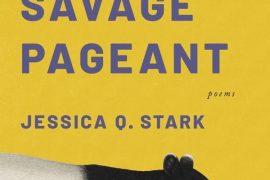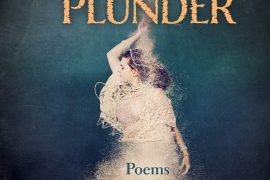I once believed
the Golden Ratio was God’s fingerprint—
before the chemicals branded my skin
with his cleansing touch.
It’s hard to see sacred geography now,
to feel beyond the pain of betrayal—
that holy fire we drank up
in full, unguarded faith.
Read McCabe to unearth the narratives that have been buried, and to remind yourself that once stories are told—no matter in what genre they’re expressed—true healing can begin.
Esteban Rodriguez
The Making of Give the Bard a Tetanus Shot
V.C. McCabe
My book’s journey to publication can be summed up by the Christina Rossetti quote “Does the road wind up-hill all the way?” I’m an autodidactic, Appalachian, working class, female poet, so getting my work published often felt like an arduous and lengthy uphill climb. As a child, I was introduced to poetry by my grandmother and I wrote my first poem at age 12 after a death in my family. My biggest influences were Plath, Frost, Shakespeare, Vonnegut, Sharon Olds, and Wendell Berry. My book really took shape after a series of environmental disasters, both natural and industrial, devastated West Virginia—including the 2014 WV Chemical Spill/Water Crisis and the historic 2016 WV Floods. My first print publication was Falling Star Magazine in 2004, but it wasn’t until the circus of disasters came to town a decade later that I made a concerted effort to submit to literary journals. In 2016, Poet Lore published “No Trespassing” and Boulevard held “Snow Cream” with positive feedback. This kicked off a steady stream of acceptances from over 50 literary journals, including Appalachian Journal, Appalachian Heritage, Spillway, Tar River Poetry, and The Minnesota Review. I collected those published poems into a manuscript. I spent the next few years submitting it under various titles to book publishers. I eventually chopped it down to an environmentally themed chapbook titled Cover Us with Mountains, which was selected as a finalist in the 2018/2019 Bone & Ink Chapbook Series. Then my newer poems “Give the Bard a Tetanus Shot” and “Give the Bard a Hep A Shot” were accepted by Barzakh and Barnhouse, respectively. Those poems and chapbook became the backbone of my book. I revised it again, removing old poems, writing new ones, printing it out to scatter and sort pages into sections on the floor, reading it aloud over and over until I felt it was a cohesive book, one I would want to read. This time I only submitted to a few publishers, including Vegetarian Alcoholic Press. A few months later, it was accepted for publication. Vegetarian Alcoholic Press’ Editor, Freddy La Force, has a well-earned reputation for being kind, honest, and giving his authors creative control. I can’t imagine a better, more encouraging editor for my first book. Freddy is also the most patient man on earth, because I became somewhat obsessive during the editing process with formatting poems for the printed page and designing the cover art. In writing Give the Bard a Tetanus Shot, I followed the adages to “write what you know” and “write the book you want to read.” I wanted to give solace to my fellow Appalachians and insight into life here for outsiders. I honestly prepared myself for bad reviews. I thought critics would laugh and deride this uneducated Appalachian girl’s attempts at poetry. At best, I thought my book would be ignored. So, it has been a thrilling shock for it to have received so many rave reviews. This experience has exceeded all my hopes and dreams. [/vc_column_text][/vc_column][/vc_row]



